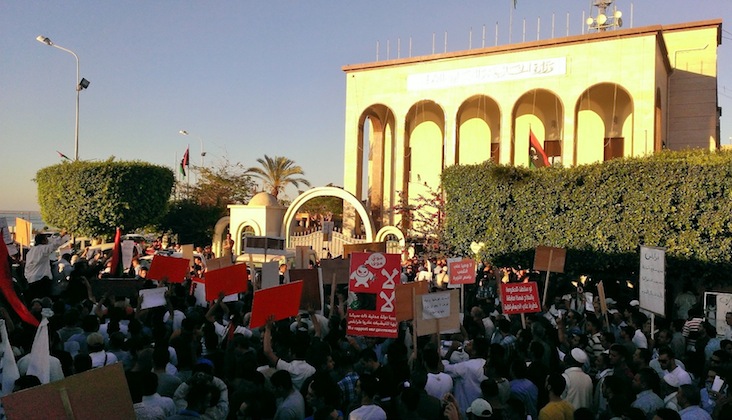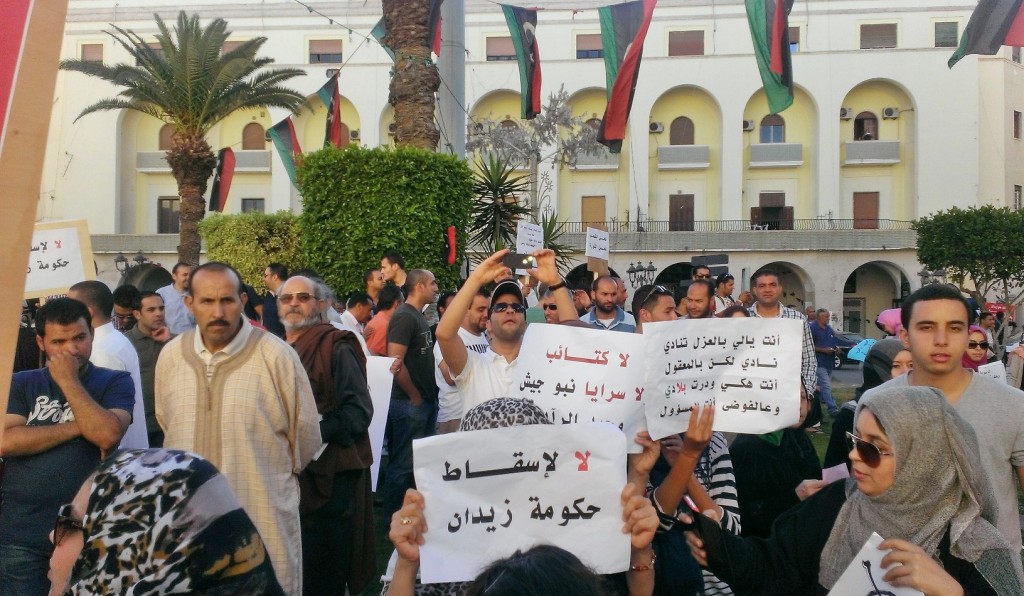By Aimen Eljali and Hadi Fornaji.

Tripoli, 10 May 2013:
Militiamen who have been besieging the Foreign Ministry this evening fled when hundreds . . .[restrict]of pro-democracy supporters arrived at the building to demonstrate their support for the government.
Around 200 demonstrators had marched from Algeria Square along the Corniche to the Ministry but were quickly joined by others along the way, overwhelming the couple of dozen or so militiamen who were still mounting their siege outside the Ministry buildings.
Some of these retreated further along the Corniche. Around six or seven others rushed behind the walls of the Ministry annexe across the road from the main building and from there tried to berate the protestors. When these ripped down the militiamen’s signs, one of the latter tried to hit out at protestors from the top of the wall with a long stick. The result was that dozens of demonstrators started banging on the gate to try and get in and then rushed round to the side entrance, hoping to grab the man.
There then followed some quick negotiations at the gate between the two sides in which the militiamen, claiming to be from Benghazi and there to guard the ministry, said that they would deal with the man. They then retired to a corner of the compound and took no further part in proceedings.
Earlier in Algeria Square, around 400 anti-militia protesters brought traffic to a halt. Placards read: “With our blood we will defence the legitimacy of the government”, “No to bringing down the government with arms” and “Get rid of the guns in your hands and start building Libya”.
“I don’t like Zeidan”, said a protestor, “but he was appointed by a democratically-elected Congresss. “We must support him”.
Others agreed. “I don’t want him removed this way”, said one of them. “It must be Congress that decides.”
The crowd roared anti-militia chants interspersed with takbeers (“Allahu Akbar”) and occasional barbs at Qatar.
“We don’t want to be ruled by Mozah and Hamid,” they shouted – a reference to the Emir of Qatar, Hamid bin Khalifa Al-Thani and his wife, Sheikha Mozah, who was brought up in Libya. Qatar is accused by many of interfering in Libya by funding Salafists and other Islamists.
Placards also called on Qatar to stop interfering.

Not all the protestors in Algeria Square headed to the foreign ministry; about half stayed to continue their demonstration there.
Over at the Ministry, numbers grew to around 800. There, the cries of opposition to gun-law continued, again interspersed with calls against Qatar as well as demands that Chief of Staff Yousef Mangoush be dismissed. Many held him responsible for the actions of the militiamen, some saying that he had proved incapable of stopping them, others saying that he was complicit in formenting them. Many others accused either the Muslim Brotherhood or Salfists of being behind the sieges and the attempt to bring down the government by force.
One protestor outside the Ministry, Yassin Kabar, said that his brother Rashid had been hanged at Tripoli University by Qaddafi in 1984. “That’s why I’m here – to stand up for democracy against these gunmen.” They had been chased away, he said, because they did not represent the Libyan people. “The people are the real force in Libya, not the gunmen,” he stated.
The numbers in both Algeria Square and outside the Ministry were much higher than expected and, following the Prime Minister’ stand on Tuesday when he told Defence Minister Mohamed Bargahthi not to resign, felt like a watershed event, a turning of the tide against the militias. “It’s going to be good now,” said another of the protestors.
It was pointed out that the militiamen had not entirely disappeared. The dozen hanging around further along the Corniche, leaning against the balustrade, saying nothing, were angry and sullen. It was noticeable too that the militiamen’s tents, which had been there in the morning, had gone as had their gun-mounted vehicles that had been hiding behind the Ministry gates.
But could they not be back with more to blockade the Ministry later, once the protestors had vanished? “No”, said one of the protest organisers. “They have discovered that they are not loved and do not represent Libya. We’re not going to tolerate this nonsense any more.” In any event, he said, there would be a mass march on Sunday morning, to lead Foreign Ministry staff back to work.
Nonetheless, outside the Ministry there was a small but growing gathering of militiamen supporters at the edge of the demonstrations, glaring angrily at the protestors.“They’re not going to take this lying down,” said one journalist covering the event.
It did not take long for his prediction to prove true.
Shortly after the demonstration was largely over, several pro-militia supporters moved into the area, chanting “No to Azlam (a reference to those whom they say supported Qaddafi). One pushed a journalist out the way and then grabbed a demonstrator’s sign and tore it up. Another shouted to a woman protestor: “What are you doing here? Go home, you whore!”
They were also seen in nearby streets trying to grab people who may have been at the demonstration and force them into cars. They were seen to take two older men, a younger one and a woman.
A reporter was chased by a group down an alleyway behind the British Residence. [/restrict]









